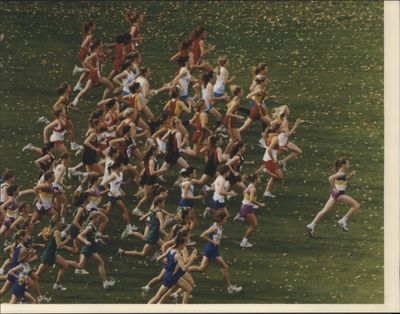This column reflects the opinion of the writer. Learn about the differences between a news story and an opinion column.
Dave Tikker: Changes to Title IX are detrimental to female athletes

By Dave Tikker
To start writing an article like this is a little awkward, not because my opinion is waffling about this subject, but because few want to have a reasonable discussion as to the ramifications of transgender girls competing on girls and women’s teams in high school, college, and eventually professional sports.
When the Department of Education in April decided to change Title IX to include Sexual Orientation and Gender Identity, the landscape of high school athletics changed dramatically. Female athletes and parents were told, not asked, to accept the outcomes of changing Title IX – outcomes such as taking away state championships in track, having to accept transgender girls dressing in girls locker rooms, and losing their spots on the team.
The WIAA, our state governing body, has a Gender Diverse Youth Sport Inclusivity Toolkit which is a resource guide for inclusive transgender and non-binary youth sport best practices. It is really well written and because WIAA has to follow Title IX guidelines they are doing their best to define participation of all student athletes.
All student athletes should have an avenue to participate in interscholastic sports. Unfortunately, when the Department of Education changed the Title IX language, it completely undermined Title IX’s original intent, protecting against sex discrimination and providing equal opportunity for female athletes. By allowing transgender girls to participate in girls sports, they did not protect girls. Rather they discriminated against girls and deprived them of equal opportunities. As a dad of three girls (two who were college athletes), I cannot even imagine a transgender girl displacing them on their high school teams, let alone having to share a locker room with a teen who has decided to change their pronouns.
In reaction to the new Title IX guidelines, legislation has surfaced in many states and governing bodies. Currently 23 states have changed their rules about transgender athletes and are not allowing transgender girls to compete on girls teams. More states need to follow, and I hope Washington will be one of them.
The National Association of Interscholastic Athletics in 2022 put together a task force to study transgender athletes. After two years, the task force created a policy that bans transgender athletes from competing in women’s sports at its 241 mostly small colleges across the country. The NAIA Council of Presidents approved the policy in a 20-0 vote at its annual convention in Kansas City, Missouri. The NAIA, which oversees some 83,000 athletes competing in more than 25 sports, is believed to be the first college sports organization to take such a step.
The WIAA has an amendment process every year to entertain possible rule changes for high school athletes in Washington. There are currently two amendments that have been turned in dealing with changing the rules about transgender athlete participation. The Eastmont School District proposed an amendment, that has the support of the Mead School Board that would change rule 18.16.0 to read “All students have the opportunity to participate in WIAA athletics and/or activities in a manner that is consistent with their gender identity. Athletic programs are offered for boys, girls, and transgender students in separate categories.
The second amendment proposed by the Lynden School District defines participation in girls’ sports limited to students assigned female at birth. Mead School Board also signed on to support this amendment.
On Monday, the Central Valley School Board voted to send a letter against transgender girls’ participation in girls sports to the WIAA.
It was way too easy to change Title IX to its current language and because the Department of Education jumped the gun without a thoughtful dialogue on this decision, there is tremendous pushback from parents, women athletes, and advocate groups as they all see the contradiction in the new language. It doesn’t protect women’s sports.
Transgender athletes should have two choices: compete in your biological sex or create a third category for transgender athletes. Either one would garner the support of most athletic directors and parents in the state.
In the meantime, as these conversations and amendment process continue, let’s do the right thing for the girls that lost out on a state championship to a transgender athlete. Give them each a first place trophy and let’s keep working at providing opportunities for transgender athletes that doesn’t disadvantage female athletes, as the original Title IX intended. The right answer is out there but it is not displacing female athletes with biological males.
Dave Tikker, of Spokane, recently retired after 15 years as the Washington State Athletic Directors executive director. He also runs the State B Basketball tournament in Spokane.